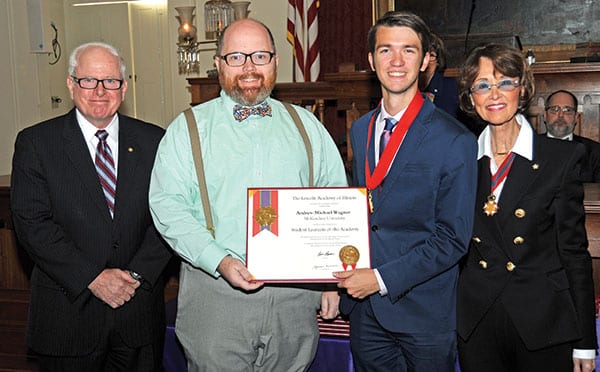Wagner named one of state’s top students

Pictured, from left, are Lincoln Academy Chancellor-elect Ron Spears, McKendree’s Stephen Hagan, Waterloo native and student laureate Andrew Wagner and Lincoln Academy Chancellor Stephanie Pace Marshall. (submitted photo)
McKendree University senior Andrew Wagner was worried he was in trouble.
He had received an email telling him James Dennis, president of the university, wanted to have a meeting with him.
Once he arrived at the president’s office, the Waterloo native learned he had been named a student laureate by The Lincoln Academy of Illinois.
“I came in thinking, ‘Oh, I might be in trouble for something. What did I do wrong?’” Wagner recalled. “But he congratulated me… So we just kind of had a nice half-an-hour talk about how proud he was of me as a student.”
The Lincoln Academy was first established by a proclamation of Illinois’ governor in 1964 to celebrate extraordinary Illinoisans.
In 1975, that mission was expanded to include honoring one student from each four-year college or university in the state. One student representing all community colleges is also honored.
The student laureates receive the Abraham Lincoln Civic Engagement Award for “their leadership and service in the pursuit of the betterment of humanity and for overall excellence in curricular and extracurricular activities.”
Wagner, who is studying international relations, was nominated by the social sciences department at the school. He was then selected to be McKendree’s representative.
“It was solely based off of their recognition of me as a student,” he explained. “I didn’t send in an application. I didn’t really have to ask anybody. It’s kind of nice, too, because it goes to show all the hard work I was putting in was being recognized. It wasn’t something I had to prod anybody for.”
Wagner was named to the school’s president’s list in the spring semester for having a perfect grade point average.
In addition to his academic success, Wagner is also active on campus and in the community.
He is on the university’s speech and debate team, plays in multiple bands including the marching and concert bands, serves as head of the Model United Nations and was a member of a service fraternity.
He also volunteers, spending his entire junior year teaching Spanish to middle school students at a Lutheran school, among other service activities.
Even with his distinguished record, Wagner said he was surprised to learn about the award, which he had not heard of prior to his meeting with Dennis in mid-October.
“It was kind of jaw-dropping, honestly,” Wagner said. “I have only had a couple interactions with the president, but having him say in a one-on-one experience ‘We’ve seen all the hard work that you’re doing. The university appreciates you and we appreciate you’ was great. It’s just kind of heartwarming to know that the place I’ve been calling home for the last four years has truly recognized and welcomed me to be a part of the community as I’ve worked to be a part of it.”
Wagner went to Springfield on Nov. 17 for a ceremony and luncheon for the award winners at the Old State Capitol State Historic Site.
Many speakers talked to the winners about The Lincoln Academy of Illinois and how exemplary all the students are. The organization also provided current and past winners time to network.
Additionally, each student laureate received a certificate of merit signed by Governor Bruce Rauner, a Lincoln medallion and a $1,000 check.
Wagner said the entire experience served an affirmation that he appreciated.
“It’s very much a recognition of my efforts,” he said. “I’ve worked tirelessly to kind of be the best at what I do. I try to be a good leader for those around me, and sometimes it’s a thankless job. I feel like this has kind of been the big thank you that sometimes gets left out.”
Wagner also said the recognition could serve him well in the future, such as when he applies to graduate schools after he earns his bachelor’s degree.
“It’s something people may not know of at first glance, but having the opportunity to explain it in an interview or in a conversation with somebody can really explain how big of a deal the award is, as well as how selective it is,” he explained. “I think that will really resonate with employers or even admission offices at universities.”






